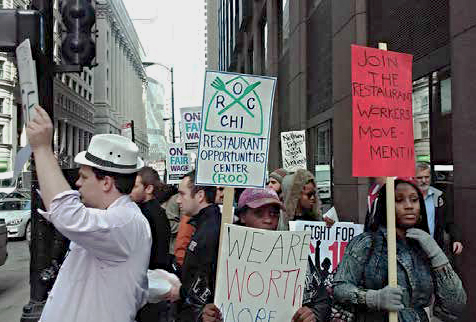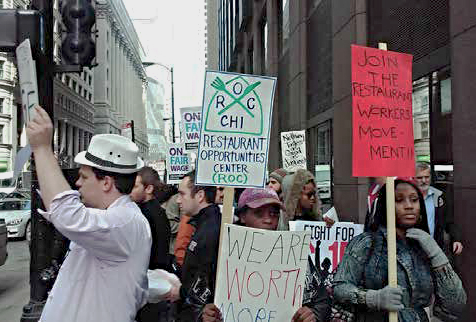Workers’ Comp Hub Newsletter: Summer 2017

In this edition of the Workers’ Comp Hub Newsletter, we focus on how a broken regulatory system has enabled a culture of systematic retaliation and fear to take hold in low-wage workplaces, and how affected workers are leading efforts to restore rule of law and protect their rights. Read that story below, and check out the full newsletter for more news on threats to workers’ rights under Trump’s aggressive anti-immigrant policies, OSHA’s worrisome delays on several important health and safety rules, and significant state legislation on workers’ comp and universal healthcare.
Ending Retaliation and Challenging the “Business of Fear”

A new report from Raise the Floor Alliance and National Economic and Social Rights Initiative (NESRI) documents widespread employer intimidation and retaliation against Illinois workers, identifies why the state’s legal system has failed to protect workers and guarantee access to workers’ comp, and lays out a plan to empower workers to restore justice.
Low-wage workers face widespread abuses. Dangerous conditions, injuries, denial of workers’ comp, wage theft, discrimination, sexual harassment, and suppression of worker organizing are all rampant. In one seminal survey (the 2008 Unregulated Work Survey Project), more than 20% of low-wage Illinois workers reported retaliation for reporting an on-the-job injury, and a mere 3% were able to access workers’ comp benefits for a severe injury.
Through the report, Raise the Floor’s workers’ center members draw attention to a wide range of dangers and abuses in many of Illinois’ low-wage industries. They also highlight how employers use intimidation and retaliation—including threats like reduced pay, firing, and deportation—to keep workers silent about these abuses and to prevent them from filing for workers’ comp.
How has this culture of fear and abuse gotten so out of hand? The downward spiral of unacceptable working conditions, employer intimidation, and the resulting silence of threatened workers is linked to inadequate legal protections and regulation.
As in every state, Illinois’ anti-retaliatory laws are made up of a patchwork of confusing and often arbitrary specifications about what is protected and what is not. Employers deploy a range of retaliation tactics, ranging from changing work duties or reducing hours to firing workers or calling immigration authorities. These types of actions are prohibited under wage, non-discrimination, and health and safety laws (though they are often ignored). Illinois’ workers’ comp law, however, only protects an injured worker from being fired for filing a workers’ comp claim, but not from any other retaliatory measures an employer may take.
The regulatory system that is supposed to oversee workplace conditions is similarly fragmented. In addition to the courts, there are at least six separate oversight and enforcement bodies in Illinois governing wage theft, health and safety hazards, discrimination and sexual harassment, and violations of the right to organize. Most of these agencies simply respond to worker complaints, taking no proactive efforts to monitor or investigate violations of workers’ rights. Of those that do take agency-driven action, the ratio of workers to regulators is shockingly inadequate. At OSHA and state occupational health agencies, which enforce workplace health and safety standards, there is only one full-time employee for every 63,100 workers. It would take inspectors over 100 years to inspect every American workplace.
What’s more, the legal process makes it exceedingly difficult for workers to prove their employer has retaliated against them. Workers face a high burden of proof to demonstrate that an employer’s actions were in response to their own claim or complaint. Judges usually give employers the benefit of the doubt, meaning most can get off the hook simply by claiming their actions were unrelated to the worker voicing concerns. In addition, systemic delays and procedural difficulties make the process costly for workers, who already have limited time and resources. Rather than win or lose, many workers are simply “processed out the door,” says a long-time Illinois attorney. Workers also have to find representation for cases that don’t always promise to compensate attorneys well, even if the outcome is successful.
In the rare instances when a worker’s retaliation claim is successful, the payoff is often paltry. Winning a case usually means receiving back pay and being reemployed. This rarely costs employers more than they already owed harmed workers. Even this cost, however, is unimposed in cases involving undocumented workers. When penalties are imposed, which is rare, they are low and unrelated to corrective action, meaning there is little to encourage employer compliance.
Without adequate protections that allow workers to speak up when they see a safety hazard or have their rights abused, conditions themselves worsen, employers are not held accountable, and already at-risk workers become more vulnerable. So what is to be done?
The path to more just workplaces starts with workers themselves. The report emphasizes that “workers are in a unique position to monitor violations of their own rights at work and be the frontline in improving conditions.” To empower worker-led action and hold Illinois employers accountable, the report makes several recommendations for legal reforms. These include broad legal protections and fair assumptions, including a burden of proof that ensures all workers reliable access to relief in case of retaliation; a path to justice that meets workers’ needs, including timely resolution of their complaints; and legal penalties and other enforcement measures that effectively deter employers from delaying and denying justice for workers.
To learn more, check out the full report here.
News Roundup
The Ohio Legislature rejected a budget bill that would have excluded undocumented workers from workers’ comp, thanks to action led by Policy Matters Ohio, Catholic Charities, the AFL-CIO, the Central Ohio Worker Center, the Ohio Interfaith Immigrant and Migrant Justice Coalition, legal aid groups and the National Employment Law Project (NELP). As NELP argued, limiting workers’ comp benefits for undocumented workers not only undermines the purpose and effectiveness of the system as a whole, it also incentivizes unlawful exploitation of immigrants and violation of health and safety standards for vulnerable, low-wage workers who fear retaliation. Testimony submitted by Policy Matters Ohio to the Senate further emphasized how the measure would obstruct injured immigrant workers’ access to justice, lead to a general degradation of workplace safety, and shift costs for workplace injuries onto lawful employers, hospitals, and taxpayers.
In Pennsylvania, the Supreme Court declared a 1996 law unconstitutional. The law used American Medical Association (AMA) guidelines to cap workers’ benefits for permanent partial disabilities at 500 weeks. The court determined that because the AMA’s formula was developed without transparency, accountability and worker participation, the law unjustly denied workers their right to workers’ comp. In other news, the Pennsylvania Legislature is considering a workers’ comp bill disguised as an anti-opioid measure that could have worrisome consequences for injured workers.
A report from ProPublica exposes how Case Farms, a poultry processor and one of the most dangerous workplaces in America, preys on immigrant workers, exploiting workers’ vulnerability to violate labor laws. The company has been cited for 240 violations in the past seven years, and workers regularly suffer debilitating carpal tunnel syndrome and amputations, but are fired as soon as they speak up about injuries or work conditions.
In Massachusetts, fears of deportation as retaliation came true for Jose Flores, an injured construction worker who was detained by Immigration and Customs Enforcement after filing a workers’ comp claim. Thanks to support and pressure from Metrowest Worker Center, MassCOSH, and other members of the Immigrant Worker Center Collaborative, Flores was released to his family while investigations of retaliation proceed against his employer, Tara Construction, which was illegally uninsured at the time of the injury. Flores’ case is representative of a much wider problem, and “sends a chilling message to immigrant workers,” says Boston physician Lara Jirmanus. Jirmanus reports that about half her patients do not report workplace injuries or unsafe conditions because they fear retaliation from employers who bully employees into using private insurance and staying quiet.
California workers report a similar experience, saying Trump’s aggressive anti-immigrant policies and public arrests have made many undocumented workers fearful to seek legal help when injured on the job.
Uber is denying drivers the full rights and protections of workers, including by encouraging drivers to opt into a new private insurance concerning their work-related injuries. Drivers would have to pay for the insurance themselves, and the plan would only offer a subset of the rights and protections that workers are entitled to in workers’ compensation systems.
As millions of Americans face the possibility of losing health care coverage in the Republican assault on the Affordable Care Act, the movement for universal health care has gained ground in two states. The Campaign for a Healthy New York and Healthy California both passed bills for universal, publicly financed healthcare through one chamber of their state legislatures. Both bills would appoint a board that would be responsible for developing a plan on how to incorporate workers’ comp into the new universal health care system. The two bills, which would pay for universal health care as a public good in large part by taxing corporations and the wealthy, have generated predictable blowback from the insurance industry and key Democratic Party powerholders. With the New York bill one vote short in the State Senate and the Speaker of California’s Assembly refusing to bring the Healthy California Act to a vote this year, both campaigns are redoubling their efforts in preparation for the 2018 legislative season.
Under Trump’s administration, OSHA has wavered on several important commitments to workplace health and safety, including delaying enforcement of its new silica exposure limits, pushing back action on a rule requiring electronic, publicly-accessible workplace injury reporting, and proposing exemptions for major industries from its new standards for beryllium exposure. OSHA’s hesitancy is indicative of the Trump administration’s willingness to sacrifice workers’ health, safety, and lives in the name of deregulation.
Colorado is creating a fund to help injured workers whose employers fail to carry workers’ comp insurance, thanks to a new law signed June 5th.
Illinois Democrats passed workers’ comp reform creating government oversight of insurance agencies and their billing practices, countering Governor Rauner’s campaign for anti-worker measures that would have cut many injured workers out of the system.
A decision from the West Virginia Supreme Court of Appeals excludes inmates from workers’ comp when they are injured on a work-release job, even when such injuries affect an individual’s ability to get work once released.
Save the Date
National COSH’s National Conference on Worker Safety and Health will be held December 5-7 in Baltimore.
Tools
This interactive map from Migrant Clinicians Network and Farmworker Justice has info on workers’ comp and pesticide reporting for farmworkers in all 50 states.Reports
“Challenging the Business of Fear”
Featured in our headline article this month, this report from Raise the Floor Alliance and NESRI investigates the use of retaliation and rampant violation of workplace safety laws in Illinois’ low-wage industries.
“Confined Space”
Check out this new blog on workplace safety and labor issues by Jordan Barab, Deputy Assistant Secretary for OSHA under the Obama Administration and formerly Director of Safety and Health for AFSCME.Occupational Health in California
A report from California’s Department of Public Health presents data on occupational health and safety from 2008-2013, showing the state has over 1.7 million employees in high-risk industries and over 100,000 workers per year who lose work time due to work-related injuries.
“Milked: Immigrant Dairy Farmworkers in New York State”
The Workers’ Center of Central New York and Worker Justice Center of New York released this report documenting mistreatment of immigrant workers on NY dairy farms and the fight for farmworkers’ right to organize.
“Sold for Parts”
ProPublica documents how Case Farms, one of the country’s largest chicken producers and most dangerous workplaces, exploits immigrant workers’ vulnerability.
